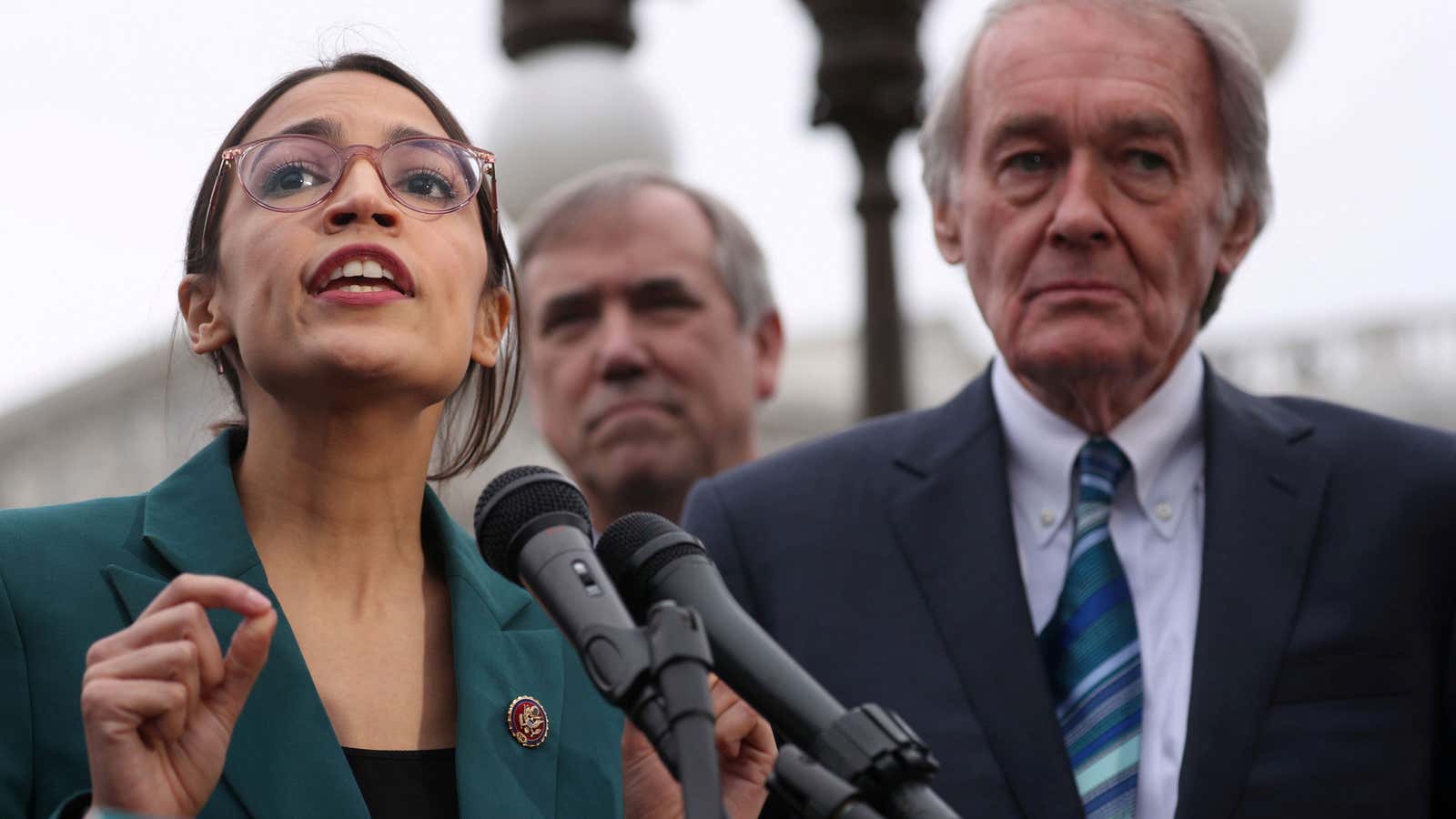The greatest source of division in our times is not between the right and left, or extremists and moderates. There is a far more profound and destabilizing division that is starting to emerge, threatening to undo the social contract that has long determined how countries redistribute resources. It is the war between generations, stoked by a new populism that pits the young versus the old more explicitly and aggressively than before.
US congresswoman Alexandria Ocasio-Cortez’s Green New Deal (GND) has attracted a lot of attention. The scope of its ambition befits the comparison to the original New Deal. What is most extraordinary about it, perhaps, is that after years of entitlements geared toward the elderly it is an economic manifesto that makes the case for devoting more resources to the young. If adopted, an 18-year-old would enter adulthood with far more public support for their education, work, and health than previous generations. This has implications for all of society, including those who have already graduated or have a good job.
The old New Deal
One of the legacies of the Depression-era New Deal is Social Security, the first major entitlement for older Americans. Social Security, like many other countries’ public pension systems, is financed as a pay-as-you-go benefit. That is, workers today pay for retirees’ pensions under the agreement that future generations will do the same for them when they retire. This means that early recipients of the New Deal paid in very little in return for a decent pension. The way pay-as-you-go financing works, in fact, is that each successive generation gets less return for what they put in.
By contrast, the GND not only attempts to preserve the environment for future generations, it calls for guarantees to provide well-paid jobs, generous parental and medical leave, vacation allowances, high-quality education, healthcare, affordable housing and other benefits more relevant to the young than the old. There is one mention of “retirement security,” but make no mistake: this is designed to create large entitlements explicitly for younger Americans, delivered by a 29-year-old congresswoman.
Every economy has a fixed amount of resources to spend on entitlements. Historically, America has spent a lot on the elderly: in 2018 40% of federal spending went to elderly entitlements, which is projected to rise to 50% by 2029. There is some confusion about how to fund the GND, but assuming it is paid for though a combination of taxes and reasonable levels of debt, the US could not afford to increase Social Security (a policy favored by other Democrats), offer universal healthcare, guarantee jobs for a living wage, and subsidize daycare, college tuition, and many other things as well. Choices must be made about priorities.
These choices are not only facing people with “progressive” politics. In the US, the Republican party is also divided between lawmakers who pass tax cuts that run up deficits to offer benefits to mostly older, wealthier people and the few remaining deficit hawks who worry about the debt burden pushed onto future generations.
Take the proposal to expand Medicare to the entire American population, which is gaining steam among the left in the US. Currently, Medicare just covers the elderly. Medicare also pays hospitals and providers less than private health insurance. There is some evidence that hospitals charge private insurance more to subsidize Medicare patients, though the size of the subsidy is hotly debated. This subsidy acts as yet another transfer from the young to the old. Expanding Medicare to cover everyone eliminates it, which means hospitals may have to charge more, reduce care, or cut payments to providers. Whatever happens, the outcome pits the young and old against each other.
Another battleground is schools. Teachers across America are striking, fed up with low pay and large classrooms. School officials claim extra money is simply not available (paywall). This is in large part because municipalities have large obligations to retired and soon-to-be retired teachers. The nature of these defined benefit pensions means that older teachers are compensated more than younger teachers. Better pay for all teachers, and more resources for students, demands that cash-strapped officials choose who gets more: students, young teachers, or older teachers and retirees.
Battle plan
Notice a pattern developing? In the past, young Americans obliged when their tax dollars went to older citizens, because they were comfortable with the promise of similar benefits one day for themselves. In the meantime, the elderly used their time and money to form powerful lobbying groups to represent their interests and convince lawmakers to devote even more money to their causes. But if Ocasio-Cortez is a fair representation, millennials and younger generations may not be satisfied with this deal for much longer.
It is too soon to tell who will win the fight. Odds are that current or soon-to-be retired people will not see their pension and benefits cut in the short term. A more likely outcome is that the trend of steadily expanding elderly entitlements will be reversed. Defined benefit plans might disappear for public-sector workers and health coverage won’t be expanded to cover all of retirees’ health expenses.
The upshot is that if you are young or middle-aged and want to survive the generational war, it would be wise to save and plan on more self-sufficiency for your retirement. This may not require too many sacrifices: children today may have more benefits provided to them in terms of education and work in the future, so parents can set aside money for retirement instead of subsidizing their underemployed, debt-laden kids as they find their feet in the world.
